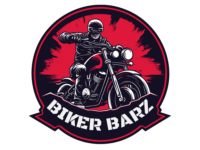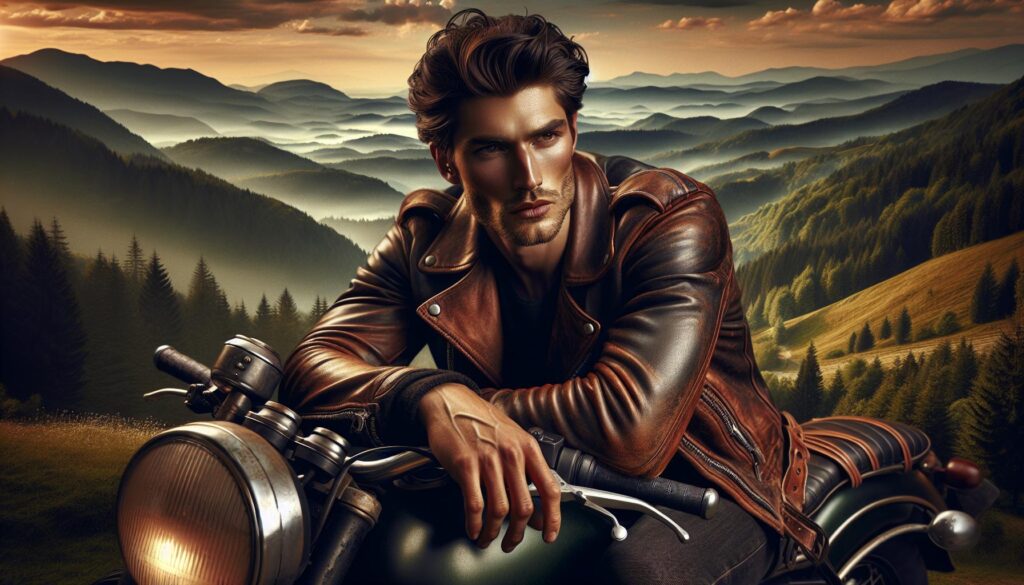The roar of engines and the wind in your hair come alive through the timeless appeal of motorcycle songs. These anthems have captured the rebellious spirit and freedom of two-wheeled adventures for generations, creating a unique musical genre that resonates with both riders and dreamers alike.
From Arlo Guthrie’s quirky “The Motorcycle Song” to Steppenwolf’s iconic “Born to Be Wild,” motorcycle-themed lyrics have become an essential part of rock and roll history. They tell stories of life on the open road, celebrating the unbreakable bond between riders and their machines while embodying the essence of adventure and independence that motorcycles represent.
The Motorcycle Song Lyrics
“The Motorcycle Song” emerged in 1967 as a whimsical folk tune that combined humor with social commentary. The song became a signature piece in Arlo Guthrie’s repertoire featuring an unforgettable story about a motorcycle crash.
Arlo Guthrie’s Musical Inspiration
Arlo Guthrie crafted “The Motorcycle Song” during a motorcycle ride through the Berkshire Mountains in Massachusetts. The song’s creation stemmed from a real incident where Guthrie nearly crashed his motorcycle while trying to avoid a VW Microbus. He transformed this experience into a comedic narrative about a rider who encounters a police officer after dumping his motorcycle off a cliff to avoid hitting a pickle. The melody incorporates traditional folk elements with a playful twist reflecting Guthrie’s distinctive storytelling style.
Historical Context and Release
“The Motorcycle Song” first appeared on Arlo Guthrie’s 1967 album “Alice’s Restaurant.” The late 1960s marked a period of social upheaval with motorcycles symbolizing counter-cultural rebellion. The song’s release coincided with the rising popularity of motorcycle culture in American music. Radio stations initially played the shorter single version though fans gravitated toward the extended album cut featuring Guthrie’s signature spoken-word interludes. The track gained additional exposure through Guthrie’s live performances at notable venues like the Newport Folk Festival.
Breaking Down the Lyrics
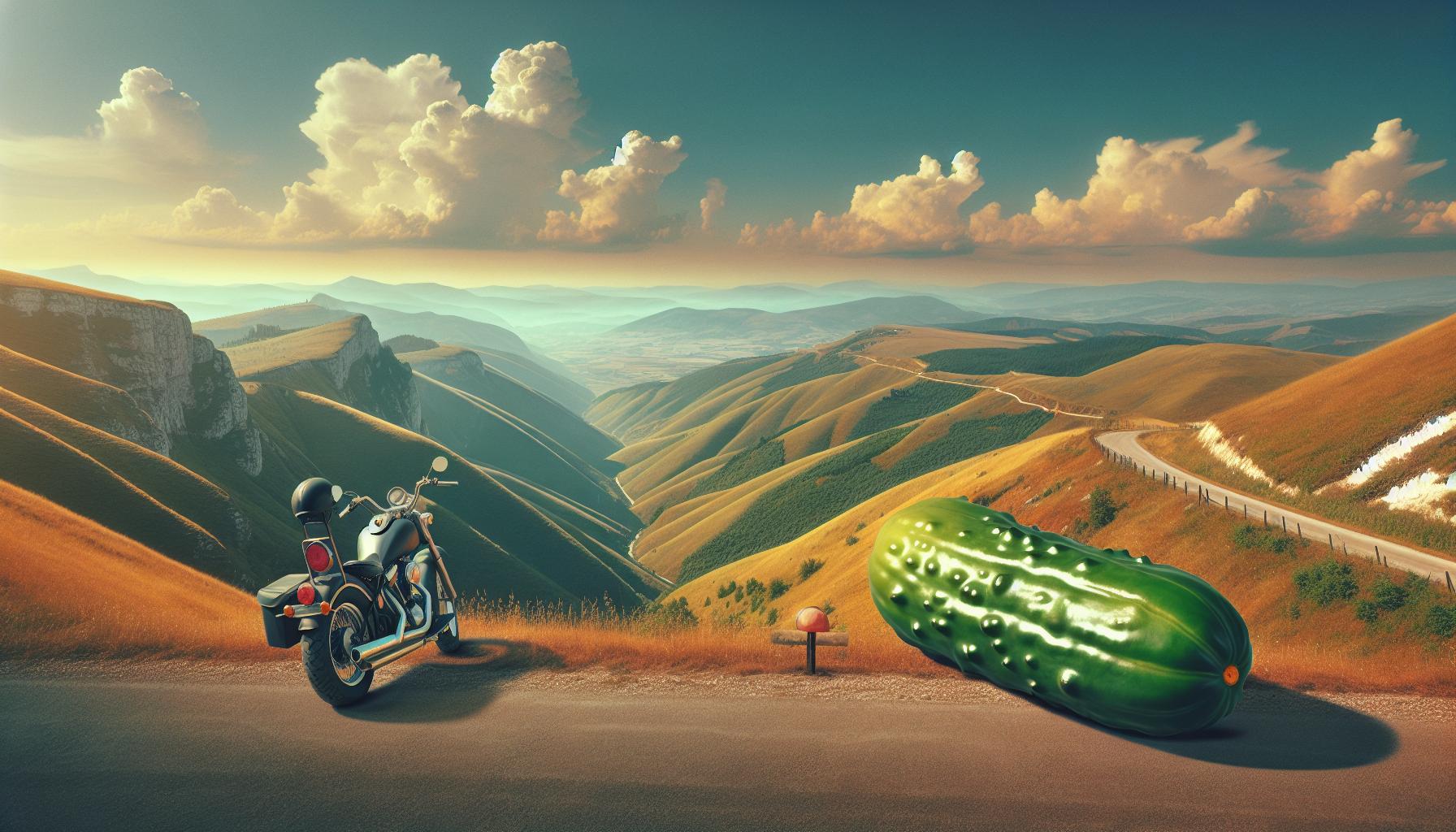
“The Motorcycle Song” weaves together absurdist humor with subtle social observations through its deceptively simple narrative. The lyrics present a unique blend of folk storytelling traditions with counter-cultural elements.
The Pickle Narrative
The song’s central storyline revolves around a motorcycle rider encountering a pickle in the road. Faced with the choice between hitting the pickle or crashing his motorcycle, the narrator opts to sacrifice his bike by driving it off a cliff. The chorus reinforces this peculiar decision with the memorable lines “I don’t want a pickle, I just want to ride my motorsickle.” This absurdist tale showcases Guthrie’s talent for creating memorable imagery through unconventional storytelling. The pickle serves as both a literal obstacle in the narrative and a metaphor for life’s unexpected challenges.
Hidden Social Commentary
The lyrics contain deeper messages about societal conformity beneath their comedic surface. Guthrie embeds critiques of authority figures through references to law enforcement reactions to the motorcycle incident. The repeated emphasis on personal choice – choosing to save a pickle over a valuable motorcycle – represents individual freedom versus material possessions. The song’s underlying themes connect to 1960s counter-cultural movements by questioning conventional wisdom through humor. References to “the law” highlight tensions between motorcycle culture and establishment figures during this period.
Musical Composition and Style
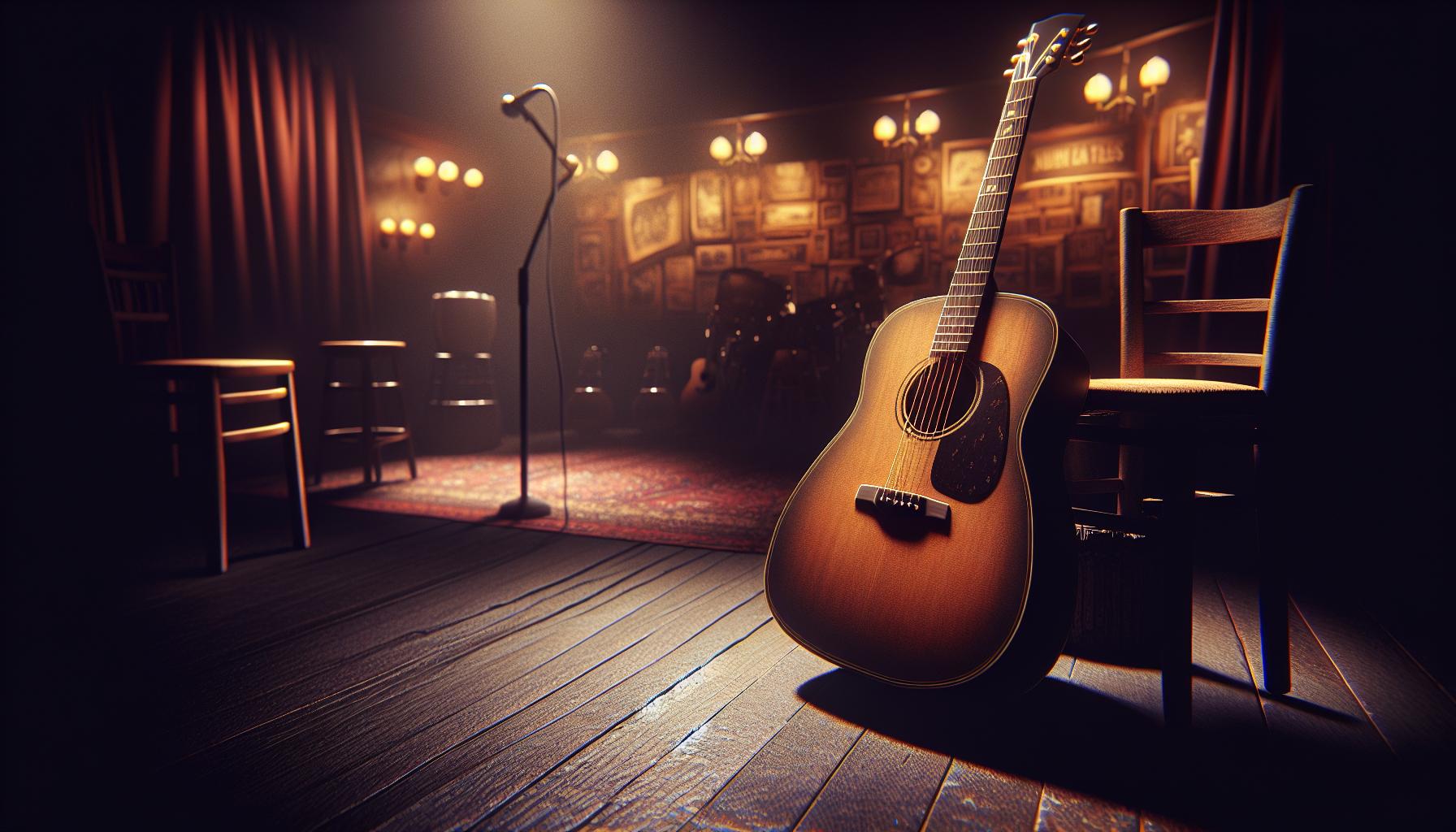
“The Motorcycle Song” combines folk storytelling with whimsical musical elements, creating a distinctive sound that exemplifies Arlo Guthrie’s signature style. The composition balances humor with social commentary through its innovative musical arrangement.
Folk Music Elements
The song incorporates traditional folk music patterns with a 4/4 time signature structured around simple chord progressions. Guthrie’s vocal delivery follows the talking blues tradition, alternating between sung verses and spoken narrative sections. The melody draws from American folk traditions, featuring repetitive phrases that echo the storytelling style of his father, Woody Guthrie. The straightforward chord structure includes basic folk progressions in G major, utilizing I-IV-V patterns common in 1960s folk music. The chorus employs call-and-response elements typical of protest songs, engaging listeners with its memorable “I don’t want a pickle” refrain.
Instrumental Arrangements
The track features acoustic guitar as its primary instrument, accompanied by basic percussion and bass lines. A harmonica enters during instrumental breaks, adding traditional folk texture to the arrangement. The backing band maintains a steady rhythm section with drums playing simple patterns that support the narrative flow. Electric guitar overdubs appear sparingly, creating subtle accent points throughout the extended album version. The instrumental mix stays minimal during spoken sections, allowing Guthrie’s storytelling to remain prominent. Studio recordings incorporate light reverb effects on the vocals, enhancing the song’s intimate performance quality while preserving its live-sound aesthetic.
Cultural Impact and Legacy
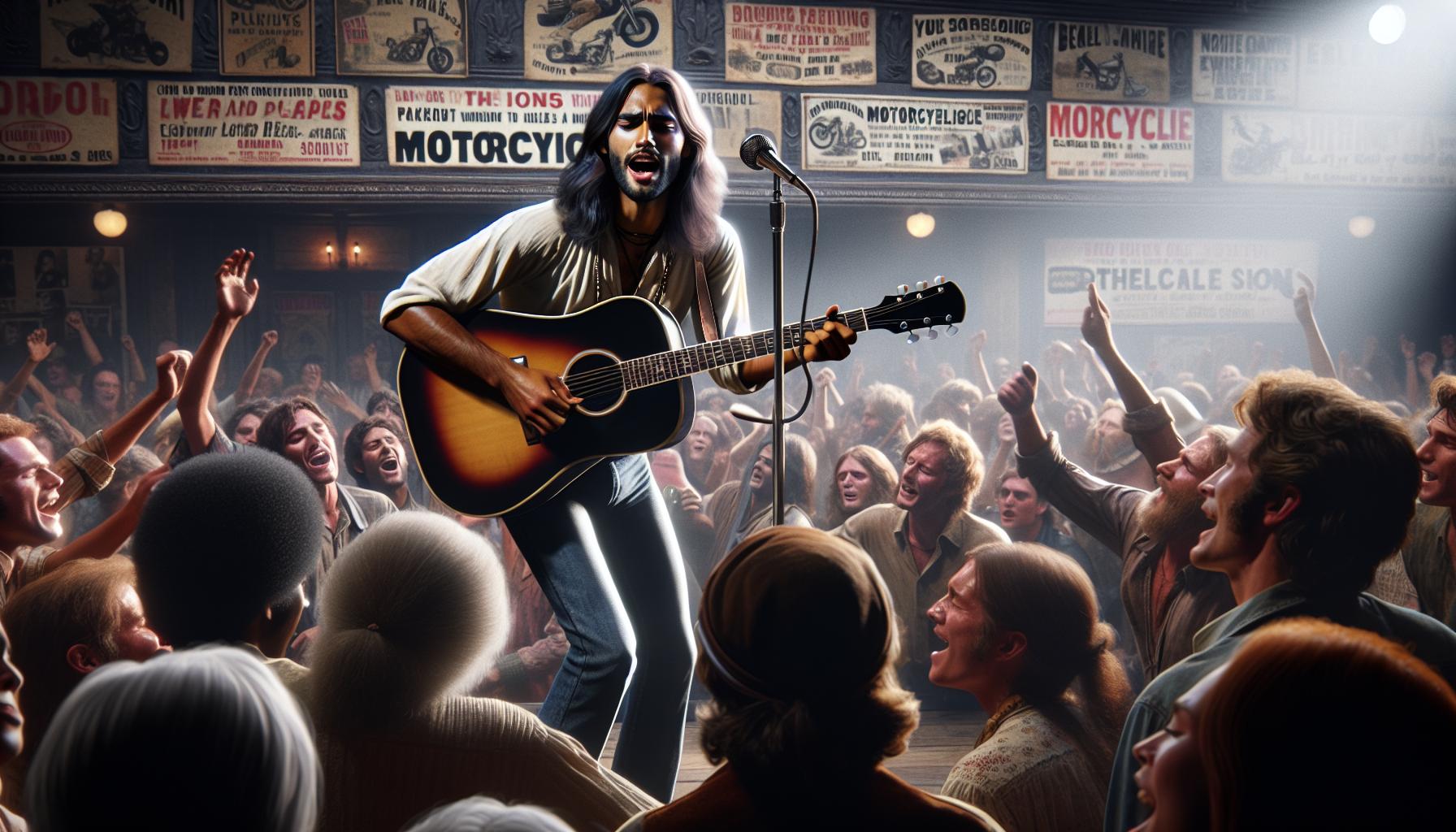
The Motorcycle Song emerged as a cultural touchstone that transcended its initial folk music origins. Its blend of humor social commentary created a lasting influence on both motorcycle culture music.
Live Performance History
Arlo Guthrie performed The Motorcycle Song at over 300 concerts between 1967-1975, including landmark shows at Woodstock Carnegie Hall. His live renditions featured extended storytelling segments that expanded the original 3-minute recording into 10-15 minute performances. Notable venues included The Bitter End in New York City The Troubadour in Los Angeles where audiences participated by singing along to the iconic chorus. Festival appearances at Newport Folk Festival Chicago Folk Festival helped cement the song’s place in counterculture music history. Each performance incorporated unique variations storytelling elements making every rendition distinctive.
Cover Versions and Adaptations
Folk artists Pete Seeger Joan Baez recorded versions of The Motorcycle Song in the early 1970s adding their interpretations to the narrative. Rock bands like The Byrds incorporated elements of the song into their live performances creating electric adaptations. Contemporary artists including Steve Earle Old Crow Medicine Show have released covers maintaining the original’s whimsical spirit. The song appears in several motorcycle-themed documentaries television shows serving as a cultural reference point. Digital streaming platforms feature over 50 recorded versions spanning multiple genres from bluegrass to punk rock interpretations.
Notable Recordings and Versions
Arlo Guthrie’s “The Motorcycle Song” spawned multiple recordings across different venues and time periods, each offering unique interpretations of the beloved folk tune.
Original Studio Recording
The original studio version of “The Motorcycle Song” appeared on Arlo Guthrie’s 1967 album “Alice’s Restaurant.” Released through Reprise Records, this 3-minute recording featured acoustic instrumentation with guitar, harmonica and basic percussion. The studio version incorporated clean production techniques characteristic of 1960s folk recordings, with minimal reverb effects enhancing Guthrie’s vocals. The track occupied the B-side of the “Alice’s Restaurant” single, reaching #63 on the Billboard Hot 100 charts in October 1967.
Live at Newport Folk Festival
Guthrie’s performance at the 1967 Newport Folk Festival transformed “The Motorcycle Song” into an extended 12-minute narrative. The festival recording captured raw audience reactions to Guthrie’s improvisational storytelling between verses. This version featured additional verses about the pickle incident plus commentary on motorcycle culture. The Newport performance established the song’s signature extended format, incorporating crowd participation during the chorus. Pete Seeger joined Guthrie on stage for this rendition, adding banjo accompaniment to the performance. The Newport recording appeared on the festival’s compilation album “Newport Folk Festival 1967” through Vanguard Records.
The motorcycle song lyrics stand as a testament to the enduring spirit of freedom and rebellion in American music culture. Arlo Guthrie’s masterpiece brilliantly combines storytelling humor with social commentary while maintaining its folk music roots.
Through its quirky narrative and memorable chorus the song has transcended generations becoming more than just a folk tune. Its influence extends beyond music into broader motorcycle culture creating a lasting impact that continues to resonate with riders and music lovers alike.
The numerous covers interpretations and live performances have kept the song’s spirit alive proving that great storytelling paired with authentic musical expression creates timeless art that speaks to the heart of American counter-culture.
